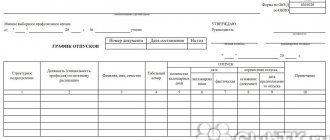The need to adhere to the vacation schedule
Citizens engaged in labor activities are entitled to rest. When these rights are exercised, the interests of the enterprise should not suffer. For this reason, each enterprise, based on the characteristics of its activities, annually draws up a special act, through which the procedure for providing rest time is regulated. When creating a schedule, it is necessary to take into account the wishes of employees.
There is a single form of the act, the T-7 form is used. At the same time, it is possible to use your own sample. A mandatory requirement is the reflection of certain details. The obligation to implement the act in question rests with both the company’s management and employees.
It is important to take into account that there is a certain group of citizens for whom labor legislation and other regulations establish guarantees for the provision of rest time, regardless of the schedule.
Persons to whom the schedule does not apply
Some employees have the right to use vacation at a time convenient for themselves. When deciding whether a vacation is necessary, a person does not need to take into account the opinion of the company’s management on this matter. This category includes:
- persons under the age of majority;
- citizens who use vacation for the first year of work in the company;
- those who have the title of honorary donor of the country;
- persons raising children with disabled status (in this case, the child should not be older than 18 years);
- female representatives who have more than 1 child under the age of 12 years;
- citizens who are raising two children under the age of 12, but they do not have a mother;
- persons participating in the Second World War, disabled people;
- combat veterans;
- citizens who suffered during the Chernobyl tragedy;
- persons holding the title of Hero of the USSR or the Russian Federation, holders of the Order of Glory.
The length of leave depends on which category the person is classified into.
Family leave
In this case, the employer can pay for rest time or provide its employee with financial support. This happens when a person dies or is born in an employee’s family. Payment is also provided if a parent or child gets sick. However, this type of leave is often provided without pay. This indicates that payment is not due to the citizen. The process of registering such rest time is regulated by the provisions of norm 128 of the Labor Code of the Russian Federation.
It is provided that a citizen is not present at his workplace for a certain period, and his earnings are not retained. The length of rest time depends on the situation in a person’s life. It is necessary to coordinate the provision of rest days with the management of the enterprise. In practice, there are situations when the director refuses a request for leave. This happens if management considers the reasons unjustified.
The law indicates that such leave is a right, but not an obligation, of the company. Exceptions include situations where rest is requested by a person who is directly referred to in the law. These categories are listed above. It is established that it is not necessary to disclose the reason for going on vacation, however, indicating it will increase the chances of a positive response from management.
How to make changes to your vacation schedule
The legislation does not provide for a unified sample application for changing the vacation schedule, however, in practice, a list of data required to indicate has been developed:
- Full name, employee position;
- Full name, position of the head of the organization;
- the subject of the application is a request to transfer the dates established in the vacation schedule to new ones and the reason for the transfer;
- date, employee signature.
If the employer, having assessed the current state of affairs of the company and established the possibility of transferring vacation to other dates, satisfies the employee’s request, he issues an order to change the vacation schedule. Next, the HR department enters new data into the relevant documents.
Please note that the employee should wait for the official response from the employer and only then leave the workplace. Otherwise, absence from work without a vacation agreed by the employer may be regarded as absenteeism.
You will find additional information in the article “How to write an application for transferring vacation - sample.”
Do not forget that the employer is obliged to pay vacation pay no later than three days before the start of the vacation (calendar days).
Unscheduled leave is also formalized by order.
Transfer of vacation - the right or obligation of the employer
The general rule provides that the employer has no obligation to provide the type of leave in question. In particular, this is the decision that was made by the Constitutional Court of the Russian Federation in 2009. It states that the rules on providing citizens with rest time upon subsequent termination of employment relations should only occur with the consent of both parties to these legal relations.
In a situation where an employee does not wait for a positive response to his application and does not go to his workplace, such behavior should be considered as absenteeism. The management of the enterprise has the opportunity to bring such a person to the established measures of responsibility, including severing the employment relationship. This conclusion can be made based on the Resolution of the Plenum of the RF Armed Forces of 2004.
It is also important to take into account that there are some exceptions to this rule. In this case, you need to take into account certain nuances:
- The legislation lists categories of citizens who have the right to use recreation at any time when it is convenient for them. A separate clause indicates that a man can be given rest during the period when his wife is on leave related to pregnancy and childbirth. At the same time, the duration of continuous work in one company does not matter.
- It is accepted that the rest time of a particular employee may be tied to a specific circumstance. For example, if a person works in several companies, then where he works part-time, he must be allowed on vacation when he rests at his main place of work.
- Certain provisions in the legislation reflect situations in which a citizen must be provided with rest outside of the schedule. The basis for this is the employee’s statement. These rules apply to cases when a person has been working for the company for the first year. Vacation planning occurs only in the second year of work.
- Also, subject to subsequent termination of the employment relationship, the citizen is given the right to rest before dismissal. You must write a corresponding application.
Deviations from the vacation schedule
According to Art.
123 of the Labor Code of the Russian Federation, the priority for granting paid vacations is determined annually in accordance with the vacation schedule approved by the employer, taking into account the opinion of the elected body of the primary trade union organization no later than two weeks before the start of the calendar year in the manner established by Art. 372 of the Labor Code of the Russian Federation for the adoption of local regulations. The vacation schedule is mandatory for both the employer and the employee. However, deviations from the schedule are still possible.
First, let's talk about cases where the law requires changing the employee's planned rest date. In particular, by virtue of Art. 124 of the Labor Code of the Russian Federation, annual paid leave must be transferred to another period determined by the employer taking into account the wishes of the employee in the following cases:
- temporary disability of the employee (for example, vacation is planned from 12/01/2015 to 12/29/2015. The employee was notified of the start of the vacation on 11/13/2015, an order was issued to grant vacation, vacation pay was paid on time. On 11/30/2015, the employee fell ill and contacted the employer with an application for transferring vacation. In such a situation, the employer cannot refuse the employee and is obliged to satisfy his request - cancel the order to grant vacation and take into account the employee’s opinion when granting vacation on other dates);
- the employee performs state duties during his annual paid leave, if the labor legislation provides for exemption from work for this purpose;
- in other cases provided for by labor legislation and local regulations.
If the employee was not promptly paid for the time of annual paid leave or the employee was warned about the start time of this leave later than two weeks before its start, then the employer, upon a written application from the employee, is also obliged to postpone the annual paid leave to another date agreed with the employee.
note
Even with the mandatory transfer of vacation, new vacation dates are determined in some cases by the employer independently, only taking into account the wishes of the employee, but not following them, and in other cases - by the employee.
Given the above reasons, employees often believe that they can go on vacation when they need to, and are completely confident that the employer does not have the right to prohibit them from doing so. Thus, the Khabarovsk Regional Court considered a dispute regarding the application of disciplinary measures to an employee who went on leave without permission after his part was transferred. The Appeal Determination dated September 12, 2014 in case No. 33‑5797 states that the employer tried many times to find out the plaintiff’s opinion about the deadline for rescheduling the vacation (the vacation was postponed due to temporary disability during the period provided for by the schedule), but the plaintiff unilaterally determined for himself the start date of the vacation and departed for it, which contradicts Part 1 of Art. 124 Labor Code of the Russian Federation.
In addition, employees can return to work on the day their vacation begins. These actions can also be considered a violation of labor discipline, which is confirmed in judicial practice. So, on the day established by the vacation schedule (07/18/2013), the employee went to work and submitted a corresponding application to the employer. The court indicated that unilateral actions by employees to postpone the date of vacation are unacceptable (Appeal ruling of the Supreme Court of the Chuvash Republic dated May 22, 2015 in case No. 33-1663/2015).
However, not only for the reasons mentioned in Art. 124 of the Labor Code of the Russian Federation, you may need to change the start or end date of the vacation. For example, an employee has certain circumstances and needs leave at a time other than planned. In this case, he contacts the employer with a statement in which he asks to change the period of rest.
Is the employer obligated to grant the application?
Documenting
In this situation, the company’s management needs to formulate an appropriate order and make clarifications to the employee’s schedule and personal documents. An order is formed using written form. It is worth noting that a unified format has not been developed; therefore, an arbitrary format is used.
This option is used when a long vacation duration is set, for example, several weeks or months. When deviations from the schedules are a couple of days, experts recommend using standard form No. T-6. The generated act is sent to the financial department of the enterprise so that payments can be accrued, provided that they are due to the citizen.
Warning about the start of vacation and payment
In the legislation, the requirement to warn an employee about an upcoming vacation is formulated using the imperative form. However, there are no exceptions to this rule. This indicates the extension of this norm to situations where the basis for granting rest time is a person’s statement. It is worth considering that such notification is not required in cases where a citizen independently determines the dates of rest.
In addition, no exceptions are provided for norm 136 of the Labor Code of the Russian Federation. This article establishes the need for payment three days before the employee goes on vacation. It is worth noting that if a notice is not sent, the legislation does not provide for liability for the employer, but in a situation with the provision of funds, it does. Liability measures are provided for in Article 236 of the Labor Code of the Russian Federation.
Vacation is considered to be used contrary to the schedule in a situation where it was postponed to another time. The consequences of these situations have different expressions. Company management has several options for behavior if an employee asks to go on vacation in less than three days:
- refuse to provide rest time;
- propose to adjust the date of going on vacation;
- indicate that it is permissible to write two applications (first, the application is drawn up for the use of unpaid vacation time, then immediately for paid vacation);
- agree to provide the rest time specified in the application.
In the latter case, it is provided that it is required to pay wages for time worked and compensation payments, provided that there are grounds for the person to receive them. When determining the date of vacation, it is necessary to take into account the employee’s wishes in this regard, but they do not need to be coordinated. This applies when:
- the citizen fell ill before using the rest time;
- During the vacation, the person will perform government duties, so exemption from work is necessary;
- other situations reflected in laws or local regulations.
It is necessary to agree on the dates if payment for vacation days is not provided in a timely manner or the citizen was sent notice of vacation later than a couple of weeks. In order to notify employees about the upcoming rest period, enterprise management can use several different methods.
In particular, it is allowed, against signature, to inform the employee about the schedule that was formed. You can also familiarize yourself with the order indicating specific vacation dates. This option should be used a couple of weeks before vacation.
Individual situations
Two situations stand out when vacation is granted only at the request of the employee, regardless of the vacation schedule:
Vacation for the first year of work. According to Part 2 of Art. 122 of the Labor Code of the Russian Federation, the right to use vacation for the first year of work arises for an employee after six months of his continuous work with this employer. From this formulation we can conclude that if an employee exercises his right, the employer does not have the right to refuse him.
Here the question arises: is it necessary to notify an employee about vacation? Indeed, what if he asks literally tomorrow for leave and the employer doesn’t mind? The Labor Code does not establish exceptions to the rule - the employee must be notified of the start time of the vacation at least two weeks before it begins. But the notification loses its meaning in a situation where the employee himself determined the date of rest, and the employer agreed to it. Since the absence of such a notice does not have negative consequences for either the employee or the employer, we believe that it is possible to do without it.
However, with the payment of vacation pay in this case, not everything is simple. Based on Art. 136 of the Labor Code of the Russian Federation, payment for vacation is made no later than three days before its start. Violation of this deadline will definitely lead to negative consequences for the employer: he will be subject to financial liability. In particular, by virtue of Art. 236 of the Labor Code of the Russian Federation, if the employer violates the established deadline for vacation payment, the employer is obliged to pay vacation pay with the payment of interest (monetary compensation) in the amount of not less than 1/300 of the refinancing rate of the Central Bank of the Russian Federation in force at that time from amounts not paid on time for each day of delay starting from the next day after the due date for payment up to and including the day of actual settlement.
What is the way out?
Firstly, you can invite the employee to rewrite the application, changing the start date of the vacation, so that the employer has the opportunity to pay for the vacation in accordance with the requirements of Art. 136 Labor Code of the Russian Federation.
Secondly, you can offer to write two statements to the employee. One is for the provision of leave without pay, and the second is for annual paid leave. The duration of unpaid leave in this case will be four days (for example, on December 11, the employee wrote an application for leave from December 14. In this case, if the accounting department tries, vacation pay can be paid to the employee on the 14th or 15th, and on annual leave he will be able to go from December 17 or 18. It turns out that there will be two applications dated December 11 - one for unpaid leave from December 14 to 16, the second for annual leave from December 17).
Thirdly, you can grant the employee vacation from the date specified in the application by calculating and paying not only vacation pay, but also monetary compensation for the delay.
For your information
The employer has the right to refuse an application for vacation not according to the vacation schedule, justifying it in Part 9 of Art. 136 Labor Code of the Russian Federation. Thus, the Chelyabinsk Regional Court in the Appeal ruling dated March 19, 2015 in case No. 11-1771/2015 recognized the employer’s refusal to provide leave upon application as legal, since even though the employee was not familiar with the schedule, he had the right to apply for leave from any date , having agreed with the employer. Due to the fact that the employer could not provide vacation without violating the payment terms, the refusal to provide vacation did not violate the employee’s rights.
Vacation followed by dismissal. By virtue of Part 2 of Art. 127 of the Labor Code of the Russian Federation, upon a written application from an employee, unused vacations may be granted to him with subsequent dismissal (except for cases of dismissal for guilty actions).
As can be seen from the wording, providing such leave is a right, not an obligation, of the employer. If he does not have the opportunity to provide rest, he may refuse the employee. In this case, the employer must additionally accrue compensation for unused vacation.
Transfer of leave at the initiative of the employer
In some situations, the need for granting leave contrary to the schedule arises from the management of the enterprise. In particular, here we can talk about enterprises with a large number of employees. Here production volumes depend on how many labor agreements are concluded.
If there are many orders, then management may decide to involve more citizens in the production process. Otherwise, profits will be lost.
A situation may also arise when difficulties arise with orders and the company loses the opportunity to provide all employees with the necessary volumes for work. The law indicates that in this case the company has an obligation to pay for the time while there is downtime. The amount is equal to two-thirds of your usual earnings. Then management understands that it is more profitable to provide employees with rest time.
It is worth considering that this option is allowed only if the employees express consent. When creating schedules, this factor should also be taken into account.
If the document is drawn up and all employees are familiar with it, then making adjustments is permissible if each employee is present. At the same time, it must be expressed in writing.
If the employer postpones vacation without the employee’s consent
When a citizen is not allowed to go on vacation or the vacation time is postponed without his consent, then the opportunity to protect his rights is provided. To do this, you need to use the following options for filing complaints:
- to a trade union organization, if one operates in the company;
- state labor inspectorate;
- to the prosecutor;
- judge.
These organizations have the right to organize a check as to whether a person has the right to such rest. If it is determined that a violation has occurred, the perpetrators will be held accountable. However, before you conflict with the company’s management, you can try to negotiate peacefully.
THERE IS NO HOLIDAY SCHEDULE - THIS IS AN UNCONDITIONAL VIOLATION
For the absence of a vacation schedule, the employer may be held liable in the form of a fine provided for in Part 1 of Art. 5.27 Code of Administrative Offenses of the Russian Federation, in the amount:
- for a legal entity - from 30 to 50 thousand rubles;
- for individual entrepreneurs - from 1 to 5 thousand rubles;
- for responsible officials of the organization - a warning or a fine from 1 to 5 thousand rubles.
There are no ways to minimize the risk of liability, other than timely approval of the vacation schedule.









